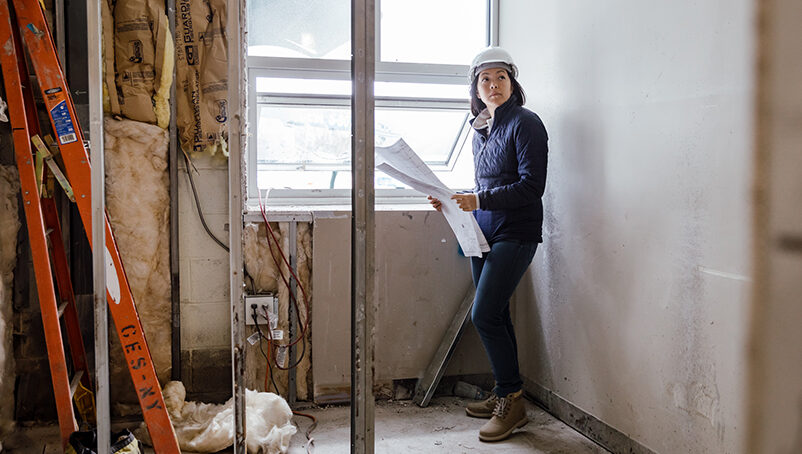Georgia
You’ll need a contractor license in Georgia if you plan to work on projects valued at $2,500 or higher. The Georgia State Licensing Board for Residential and General Contractors takes a tiered approach to licenses based on the projects you’re working on. You’ll also have to meet minimum insurance requirements, as well as education or work experience requirements:
- A diploma or transcript in engineering, architecture, project management, or building construction.
- A diploma or transcript showing college-level coursework and work experience commensurate with at least four years of university experience.
- At least four years of work experience in construction, of which two were working for a general contractor.
There are four different kinds of licenses in Georgia for general contractors:
General contractor
This license is for work that exceeds $2,500 on private, commercial, industrial, public, and other building projects.
General contractor-limited tier
This allows for the same work as a basic contractor license but with contract amounts of $500,000 or less.
Residential-basic contractor
This license is limited to projects with detached one-family and two-family residences and, one-family townhouses (not over three-stories) and adjacent structures.
Residential-light commercial contractor
This license is the same as residential-basic, with the addition of projects related to multi-family and multi-use light commercial buildings and adjacent structures.
Note that for Residential Basic and Light Commercial license applications, your proof of net worth can be a $25,000 surety bond in the individual or business organization’s name. For all other applications, you will need a signed financial letter referenced by a certified accountant. You must provide workers’ comp insurance if you have three or more employees.
Learn more about Georgia general contractor license and insurance requirements.
Hawaii
General contractors must hold a state license in Hawaii to do commercial, residential or public works worth more than $1,000 or require a building permit. The Department of Commerce and Consumer Affairs, Professional and Vocational Licensing Board awards a number of licenses, including:
- General engineering contractors (fixed works projects); and
- General building contractors (construction of structures using more than two unrelated trades).
To qualify for a license, you must show proof of liability and workers’ compensation insurance. You’ll need to pass a trade exam, as well as a business and law exam.
Learn more about Hawaii general contractor license and insurance requirements.
Idaho
Any general contractor who performs construction work worth more than $2,000 must be registered with the Idaho Contractors Board. There is no state licensing requirement for general contractors in Idaho.
In Idaho, employers with one or more employees are required to obtain and maintain workers’ compensation insurance.
Learn more about general contractor license requirements in Idaho.
Illinois
The state of Illinois does not have a state license requirement for general contractors. However, in many local jurisdictions, you must get a license and insurance before starting work.
For example, the Chicago Department of Buildings requires specific licenses based on the value of projects your business will work on. It also has minimum requirements for contractor business insurance in Illinois.
You might be able to work out a license reciprocity agreement in Illinois if you already have a contractor license in another state. If not, you’ll need to apply for a license from scratch:
- Provide a description of the work and services you aim to perform
- Specify the classification of license for which you are applying for
- Clarify your business structure and provide additional company information
- Identify and verify by affidavit that the applicant or member of your business entity is financially stable
- Submit your certificate of insurance with the City of Chicago as additionally insured and policy limits ranging from $1 million to $5 million depending on the sizes of your projects
- Sign and complete the application
You must also pay all licensing fees, which vary according to license class:
- Class A – $2,000 fee for an unlimited contract amount
- Class B – $1,000 fee for projects up to $10,000,000
- Class C – $750 fee for projects up to $5,000,000
- Class D – $500 fee for projects up to $2,000,000
- Class E – $300 fee for projects up to $500,000
Once you have your license, you need to renew it every year.
Learn more about general contractor license and insurance requirements in Illinois.
Indiana
General contractors don’t need a state license to work in Indiana. Make sure to check the licensing requirements with local governments before you begin work.
Learn more about Indiana general contractor license and insurance requirements.
Iowa
There are no state licensing requirements for general contractors in Iowa. However, any construction contractor (individual or business) who earns at least $2,000 a year doing construction work, must register with the Iowa Division of Labor.
General contractors must carry Iowa workers’ compensation insurance unless they meet one of a few limited exemptions.
Kansas
General contractors don’t need to hold a state license to work in Kansas. However, there are local licensing requirements, so check these before you begin work.
According to the Kansas Department of Labor, a non-agricultural business with a gross annual payroll of more than $20,000 must have workers’ compensation insurance.
Kentucky
You don’t need a state general contractor license to work in Kentucky. All licensing is done at the local city/county level, so check this before you begin work. Workers’ compensation insurance is required for all Kentucky employers with one or more employees.
Learn more about Kentucky general contractor license and insurance requirements.
Louisiana
General contractors must have a state license to work in Louisiana. There are five types of licenses you should consider, all of which are awarded by the Louisiana Licensing Board for Contractors:
Residential contractor license
Covers construction and home improvement projects worth more than $75,000. You’ll need to pass an exam to show a financial statement and proof of general liability and workers’ compensation insurance.
Commercial contractor license
Covers commercial projects worth more than $50,000. You’ll need to submit a financial statement and must pass the trade exam, as well as the business and law exam.
Home improvement registration
If you plan to do any home repair or improvement projects valued between $7,500 and $75,000, and you don’t have a residential or commercial license, you’ll need this license.
After you figure out which type of license you want, you need to apply for the license itself:
- Fill out your application
- Prepare your notarized financial statements
- Pick a legal representative
- Pass the exam
- Get insurance (you must have proof of general liability insurance coverage and a certificate of insurance for active workers’ compensation insurance)
- Pay relevant fees
- Get approval from the Louisiana State Licensing Board for General Contractors
Once you’ve completed all these steps, submit your application for board approval.
Learn more about Louisiana general contractor license and insurance requirements.
Maine
You don’t need a state license to work as a general contractor in Maine. However, if you undertake home improvement or construction jobs worth more than $3,000 you must provide a written contract. There may be local licensing requirements, so check these before you begin work.
All private and public employers in Maine must have workers’ compensation insurance.
Maryland
As a general contractor, you may or may not need a state license, depending on the work you do. For new home construction, you don’t need a state license, but you do need to register with the Home Builder Registration Unit of the Office of the Attorney General. If you plan to do work on existing residential property, you will need to get your Maryland Home Improvement Contractor’s License (MHIC) from the Maryland Department of Labor, Licensing and Regulation.
If you undertake any home improvement projects, you will need a license, which the Maryland Home Improvement Commission issues. In this case, you’ll need proof of two years of work experience in home improvement, construction, or related education.
You’ll also need proof of financial solvency and proof of insurance (at least $50,000 of contractor liability insurance). You must pass a business and law exam.
Commercial contractors must register at the city/county level. You’ll apply for a construction license with the Clerk of the Circuit Court in your county if you plan to work on new construction projects, excavating or curbing and paving streets or sidewalks.
The Marine Contractors Licensing Board handles licensing for general contractors that work on projects involving waterfront structures, such as boathouses, piers, ramps and wetland observation decks.
Most Maryland businesses with employees are required by state law to carry workers’ compensation insurance.
Learn more about Maryland general contractor license and insurance requirements.
Massachusetts
As a general residential contractor in Massachusetts, you must be registered and licensed. You must hold a Home Improvement Contractor registration to perform ordinary repairs to an existing property. To work on larger projects on existing properties, you must also hold a Construction Supervisor License from the Office of Public Safety and Inspections.
You can apply for an unrestricted license, a one- and two-family dwelling license or a specialty license. You must show three years of experience in building construction or design, and you must pass an exam.
Contractors who build new homes or work on commercial buildings only are exempt.
Learn more about Massachusetts general contractor license and insurance requirements.
Michigan
As a general contractor, you’ll need a Residential Builders license or a Maintenance & Alterations Contractors license to construct, repair, alter, add to, subtract from, or improve a residential or combined residential and commercial structure. You’ll need to complete a 60-hour pre-licensure course and you must pass a test.
The Department of Licensing and Regulatory Affairs (LARA) issues the general contractor license. Commercial construction contractors must contact their local county building offices for permits or licenses.
Learn more about Michigan general contractor license and insurance requirements.
Minnesota
A general commercial contractor does not need a state license to work in Minnesota. However, a residential building contractor or remodeler does need a license. The Department of Labor and Industry awards the Residential Building Contractor license.
You’ll need to show proof of liability and workers’ compensation insurance. You must pass a trade exam, as well as a business and law exam.
Learn more about Minnesota general contractor license and insurance requirements.
Mississippi
General commercial and residential contractors must hold a state license to work in Mississippi on more than $50,000 projects. The Mississippi State Board of Contractors awards the licenses.
You’ll need to pass a trade exam, as well as a business and law exam. You must show proof of general liability insurance. If you have five or more employees, you must have workers’ compensation insurance.
Learn more about Mississippi general contractor license and insurance requirements.









